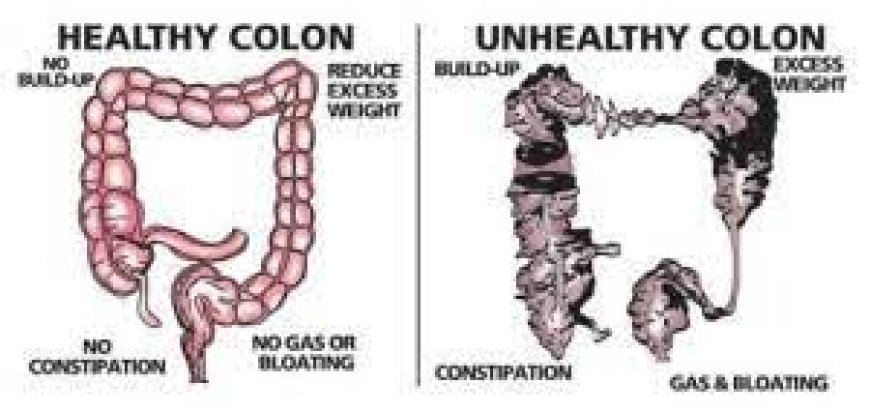Preventing Colon-Related Health Issues: Did You Know That Death Begins in the Colon?

Preventing Colon-Related Health Issues: Did You Know That Death Begins in the Colon?
Introduction
|
D |
id you know that death begins in the colon? This provocative statement has gained attention in the health and wellness community, highlighting the critical role of colon health in overall well-being. The colon, or large intestine, is responsible for essential functions such as waste elimination and nutrient absorption. However, an unhealthy colon can lead to various health issues, including constipation, diverticulitis, and an increased risk of colon cancer. In this article, we will explore the importance of preventing colon-related health problems and discuss strategies to promote a healthy colon.
Understanding the Colon's Significance
The colon is a vital component of the digestive system, and its health directly impacts our overall well-being. It acts as a reservoir for waste products, absorbs water and electrolytes, and plays a crucial role in the final stages of nutrient absorption. A healthy colon ensures efficient elimination of toxins, bacteria, and waste materials, promoting a balanced internal environment.
The Link Between an Unhealthy Colon and Disease
An unhealthy colon can lead to various health issues and increase the risk of developing serious conditions.
Colon Cancer
One of the most significant risks associated with an unhealthy colon is the development of colon cancer. The colon is constantly exposed to potential carcinogens, toxins, and harmful bacteria from the food we consume. When the colon is not functioning optimally, these substances can accumulate, leading to chronic inflammation and DNA damage in the cells lining the colon. Over time, this can result in the formation of cancerous tumors. Regular colorectal screenings, a high-fiber diet, and avoiding certain risk factors like smoking and excessive alcohol consumption can help reduce the risk of colon cancer.
Irritable Bowel Syndrome (IBS)
An unhealthy colon can contribute to the development or exacerbation of irritable bowel syndrome (IBS). IBS is a chronic digestive disorder characterized by symptoms such as abdominal pain, bloating, diarrhea, and constipation. While the exact cause of IBS is not fully understood, factors such as gut dysbiosis (imbalanced gut microbiota), increased intestinal permeability, and inflammation within the colon are believed to play a role. Maintaining a healthy colon through a balanced diet, stress management, and regular exercise can help manage IBS symptoms.
Inflammatory Bowel Disease (IBD)
Inflammatory bowel disease (IBD), which includes conditions like Crohn's disease and ulcerative colitis, involves chronic inflammation of the gastrointestinal tract. While the precise causes of IBD are not yet fully understood, a combination of genetic, environmental, and immune system factors is thought to contribute to its development. An unhealthy colon can be a trigger or exacerbating factor for IBD. Chronic inflammation in the colon can lead to damage of the intestinal lining, ulcers, and increased risk of complications. Treatment for IBD typically involves medication, lifestyle modifications, and sometimes surgical intervention.
Diverticulitis
Diverticulitis is a condition characterized by inflammation or infection of small pouches called diverticula that form along the colon wall. Unhealthy colon conditions, such as chronic constipation and low-fiber diets, can contribute to the development of diverticulosis (the presence of diverticula) and increase the risk of diverticulitis. A lack of fiber in the diet can lead to harder stool, which puts increased pressure on the colon wall, causing the formation of diverticula. Maintaining a healthy colon through a high-fiber diet and adequate hydration can help prevent diverticulitis.
Nutrient Malabsorption
When the colon is unhealthy, it can affect the absorption of nutrients from the food we consume. The colon's primary role is to reabsorb water and electrolytes, but it also plays a part in absorbing certain vitamins, minerals, and short-chain fatty acids produced by gut bacteria. If the colon is inflamed or damaged, nutrient absorption can be compromised, leading to deficiencies in essential nutrients. This can impact overall health and contribute to a variety of symptoms and conditions. Maintaining a healthy colon through a balanced diet, proper hydration, and reducing inflammation can help optimize nutrient absorption.
Strategies for Preventing Colon-Related Health Issues
Dietary Modifications
A balanced and fiber-rich diet plays a key role in promoting colon health. Consuming an adequate amount of dietary fiber from sources such as fruits, vegetables, whole grains, and legumes helps regulate bowel movements, preventing constipation. Additionally, including probiotic-rich foods like yogurt and fermented vegetables can contribute to a healthy gut microbiota, which supports colon health
Hydration
Staying hydrated is essential for maintaining proper colon function. Drinking an adequate amount of water helps soften stools, preventing constipation and promoting regular bowel movements. Aim for at least eight glasses of water per day and adjust your intake based on individual needs and activity levels.
Regular Exercise
Engaging in regular physical activity has numerous benefits for overall health, including the colon. Exercise stimulates bowel movements, improves intestinal muscle tone, and reduces the risk of constipation. Aim for at least 150 minutes of moderate-intensity exercise per week to support colon health.
Limit Processed Foods
Minimize your consumption of processed and refined foods that are low in fiber and high in unhealthy fats, added sugars, and artificial ingredients.
Manage Stress
Chronic stress can impact colon health. Practice stress management techniques such as meditation, yoga, or engaging in hobbies that help you relax.
Avoid Excessive Alcohol and Smoking
Both excessive alcohol consumption and smoking have been linked to an increased risk of colon-related diseases. Minimize or eliminate these habits to promote colon health.
Regular Screenings
Routine screening for colon cancer is crucial, especially for individuals aged 45 and older or those with a family history of the disease. Colonoscopies and other screening methods can detect polyps and other abnormalities early, allowing for timely intervention and reducing the risk of developing colon cancer.
Conclusion
Preventing colon-related health issues is of paramount importance to safeguard our overall well-being. By understanding the significance of the colon and implementing strategies such as maintaining a fiber-rich diet, engaging in regular exercise, staying hydrated, and undergoing routine screening, we can promote a healthy colon and reduce the risk of constipation, diverticulitis, and colon cancer.
Remember, while the statement "death begins in the colon" has gained attention, it is important to approach health information with critical thinking and rely on evidence-based research. Consulting with medical professionals and following their advice is crucial for personalized guidance and recommendations.







